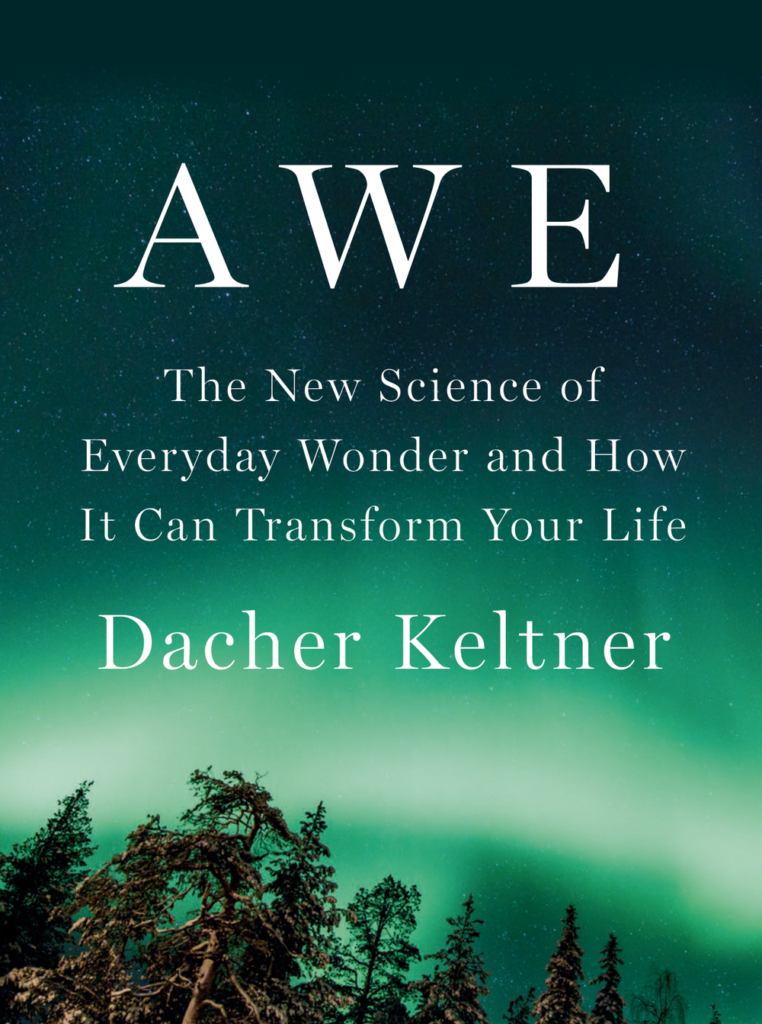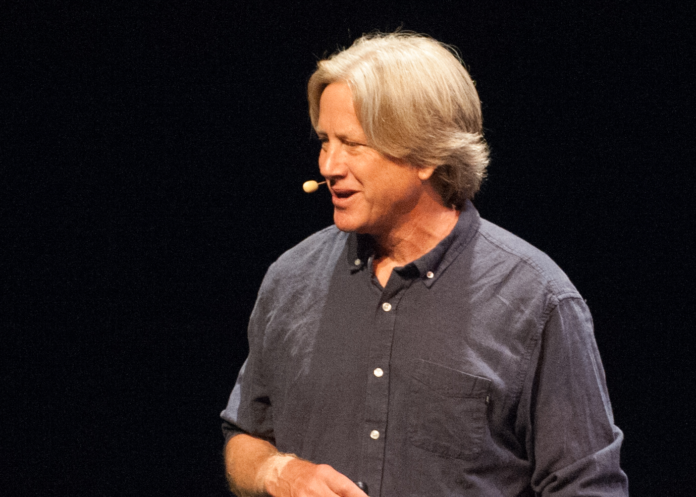There was an abundance of awe in Berkeley on January 23. A mere two blocks from the UC Berkeley campus at the First Presbyterian Church on Dana Street, it was somehow visible in a long, long queue of jacketed people, all huddled together over cell phones on which they scrolled in search of proof of vaccines and digital tickets. Action worthy of awe arrived courtesy of the Booksmith staff, who scurried up and down this line, feverishly checking audience members’ credentials for the Berkeley Arts & Letters event co-sponsored by the bookstore and UC Berkeley’s Greater Good Science Center. The awe only found in nature was available to the rare individual who bothered to look up from a phone to appreciate a blossoming leaf bud on a nearby tree teasing the arrival of spring or the crescent-shaped, brilliantly silver sliver of the moon that hung in the vast, inky night sky, at last clear of clouds after three weeks of torrential rains.

Certainly, awe was mystically evident inside the church, where the architectural balance of the vestibule was echoed in the towering stacks of best-selling writer and UC Berkeley professor of psychology Dr. Dacher Keltner’s new book AWE: The New Science of Everyday Wonder and How It Can Transform Your Life (Penguin Press, $28.)
Inside the sanctuary, awe continued. Remarkable, cooperative, communal awe was confirmed by a quick visual survey suggesting that 99 percent of the audience wore the masks required by the host organizations for attendance. This, in a time and a city and a world largely over (as in sick of/done/fed up with) the pandemic and its safety protocols. But one man whose silver hair and bright blue Oxford shirt shone with the same intensity of the moon was maskless. His bare face and flagrant breathing without protection summoned questions answered in Keltner’s book: Can awe come in response to witnessing antisocial acts or moral disruption or even atrocities? Is it found in the horror of genocide or the tragedies of war or death? Is fear a precursor to awe? Are a shudder or getting the chills and goosebumps indications of awe? Specifically, is awe what we experience when we see one person’s brazen disregard for rules (let alone his safety or that of others), or is awe reserved for more holy, revered realms?
To answer all of these and other queries, the event had two guys over the age of 50, dressed casually in jeans, one with lots of hair, one with almost none, sitting in easy chairs, and speaking to hundreds of people who almost all held in their laps copies of Keltner’s AWE.

Their bios spoke volumes: Keltner, the man with hair, is a renowned expert in the biological and evolutionary origins of human emotion. He studies the science of how compassion, awe, love, beauty, and emotions shape moral intuition. With 200 scientific publications, articles in The New York Times, Slate, and other national publications, and six books, (Born to Be Good, The Compassionate Instinct, The Power Paradox, among others), Keltner has served as an advisor for Pixar, Google, Apple, and Pinterest. He is the co-director of the Greater Good Science Center.
Keltern’s counterpart, Michael Pollan, was the man with less hair. Pollan is the author of eight books, among them New York Times bestsellers How to Change Your Mind, Cooked, Food Rules, In Defense of Food,The Omnivore’s Dilemma, and The Botany of Desire. He teaches writing at Harvard University and UC Berkeley, where in 2020 he co-founded the UC Berkeley Center for the Science of Psychedelics, a research lab using psychedelics to investigate cognition, perception, emotion, and their biological bases in the human brain. His latest book, How to Change Your Mind: What the New Science of Psychedelics Teaches Us About Consciousness, Dying, Addiction, Depression, and Transcendence, tracks the promises, perils, history, culture, his personal experience with, and latest scientific research into psychedelics. He writes in the book about discoveries in psychedelics’ potential to relieve several kinds of mental suffering, including depression, anxiety, and addiction.
This means the night was fraught with what Keltner identifies as the eight wonders and sources of personal, social, or cultural awe found in the 26 countries he studied: moral beauty; collective movement most easily recognized in activities such as dance and sports; nature; music; art and visual design, mystical encounters related to spirituality and religion; the mysteries of life and death; and big ideas or realizations.
Pollan launched the conversation with an invitation for Keltner to psychoanalyze two awe experiences he’d had recently. Both occurred while vacationing. In one, while he relaxed over drinks in a bar, someone hollered, “Northern lights!” Everyone rushed outside and Pollan saw “swirls of dancing green light” that were “transformative” and “rated a ten on the awe meter.” The other experience was attending a Pussy Riot show in benefit of Ukraine. He admitted, the Russian feminist punk collective’s music isn’t his favorite kind of music, but the band was incredible, and the experience, “kind of an assault.” What rang a bell for Pollan was the moral clarity and courage of a group whose members have more than once been arrested by Putin—but who were still loudly supporting Russia’s jailed opposition leader Aleksei Navalny.
In response, Keltner spoke of the magical properties of awe, its different sources, and yet its fundamental property of causing the self to relate to larger things. A common misconception, he said, is that awe can only be inspired by nature—the Grand Canyon, Yosemite, white-water Colorado River rafting experiences, for example. In fact, studies prove that awe comes most often from the province of moral beauty: examples of human kindness, courage, strength, or overcoming obstacles that move a person to tears or chills—not shudders, which are more about fear and horror. He spoke of a warm feeling in our chests: the vagus nerve, which controls the physical response to awe.
Without going into the prickly minutiae of their conversation, a swift summary had them touching on awe’s definition (vast, mysterious, things we can’t make sense of with current knowledge or that exceed typical, conceptual frameworks), its biological expression (those tears and chills, universal facial and postural positions, plus hormonal floods involving cortisol, serotonin, and others), and why we—or whether we do—have a need of awe.
“It’s a big question,” Keltner said about this last topic. “We’re a hyper social species.”
He pointed out that we raise offspring communally, learn by mimicking others, resolve problems like food scarcity and threats to public health together, even huddle together when cold (remember that line outdoors?) Awe results in collective benefit, also. One study Keltner mentioned involved UC Berkeley students. They were taken outdoors by scientists, and some looked at towering eucalyptus trees. All witnessed an actor who was part of the study spilling a mess of pens. Tree-exposed students offered to help retrieve the pens more often than did a control group who had not spent time in nature.
The “dissolving of self,” which Keltner said is made even more precious by today’s “selfie, narcissistic culture,” is inherent in awe. Massive chunks of the brain devot
ed to self-representations fall quiet in the face of awe that can come not just from grand ah-ha moments but from everyday, ordinary displays of courage, moral beauty, art, and other sources. Keltner said he was struck that in China, teachers were reported by students to have inspired the most awe. To his horror, in the United States, study results showed college students in America said awe was inspired 90 percent of the time by themselves, by their own achievements.
AWE is not a self-help book, but Keltner did give a few pointers: awe is everywhere and therefore, distributed equitably, not rare or exclusive to the wealthy. Awe comes from taking risks, not categorizing, asking questions, viewing novelty, or having new experiences.
“We love the known and framable, but awe destabilizes knowledge,” he said.
Most poignantly, Keltner spoke briefly—the book is more than worth reading for this alone—about the loss of his younger brother Rolf, who had colon cancer and died by assisted suicide. Witnessing his brother’s death, Keltner said it felt as if this sibling to which he was so tightly bonded was, “being pulled into a space I couldn’t recognize. I was blown off the map.”
For a long time afterwards, he couldn’t find awe anywhere. Eventually, he found it through science, writing, cherishing memories, spending time in nature and with art, and the actual sensations that made him feel as though his brother was still with him. He found it in wandering, breathing, orienting his attention to tiny and big things, noticing a reflection on his eyeglasses, or in a sea of audience faces moving in synchronicity.
This last point was a lovely way to say Keltner saw awe in those of us amassed that night in the First Presbyterian Church on Dana Street. As someone once wrote about that Monday night in mid-January 2023, there was an abundance of awe in Berkeley.
Buy Awe: The New Science of Everyday Wonder and How it Can Transform Your Life here.








